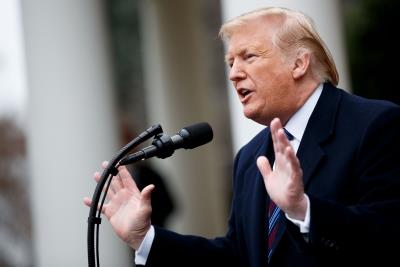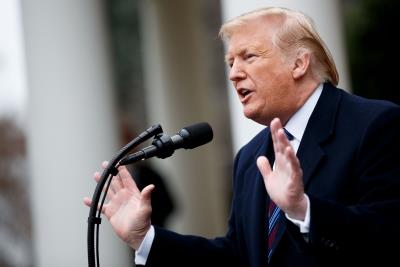
Five Republican Congress Members Favouring Trump Impeachment Fear Being Unseated

By Ashok Nilakantan
New York, June 22 (IANS) For over a year, five Republicans had been canvassing for impeachment of former President Donald Trump before the Democrat-led Senate Judiciary Committee for his alleged involvement in the January 6 Capitol Hill riots that virtually threatened the life of his Vice President Mike Pence. Today they face the fear of being unseated from the Congress as Trump has raised republican ire against them.
Ever since they broke with the vast majority of their party to support President Donald Trump's impeachment, a handful of Republican members of Congress are fighting uphill battles to retain their seats, says the Washington Examiner in a report. Voters will soon decide the fates of five of the 10 GOP House members who cast votes in favor of Trump's second impeachment in 2021. Four of the 10 have said they'll retire rather than seek reelection in the post-Trump environment.
Another Representative Tom Rice (South Carolina) has already faced voters in the primaries and discovered just how costly crossing Trump can be: He lost against a Trump-backed challenger earlier this month. Rice, like some of the other Republican impeachment backers, remained critical of Trump months after the impeachment battle had concluded.
Each of the five Republicans fighting to remain in Congress this year is facing circumstances unique to his or her district, says the Examiner. All, however, are united by the headwinds they've faced as a result of their impeachment vote.
Liz Cheney (Wyoming)
Her state's at-large congresswoman, Cheney is the most likely of the bunch to lose her seat as a result of her persistent attacks on Trump. Cheney won reelection in 2020 with more than 40 per cent of the vote, buoyed by her Congressional leadership position and conservative legislative record.
But former Vice President's Dick Cheney's daughter took her criticism of Trump beyond her vote in favor of impeachment while speaking out against the former President until she was stripped of her leadership title and ostracised from the party. Cheney has continued to put herself at odds with her colleagues by participating in the Democratic-led investigation into January 6.
Trump has publicly backed Harriet Hageman, who is challenging Cheney in the state's August 16 Republican primary.
But Hageman's challenge has become stronger with the additional endorsement she has landed, that of House Minority Leader Kevin McCarthy (Republican, California). Rather unusual for party leaders, who rarely get involved in primary challenges against incumbent colleagues, but McCarthy took the step of backing Hageman amid a consensus among Republicans that Cheney's public comments were becoming too big a distraction.
The limited polling available suggests Hageman has a healthy shot at winning. A poll published earlier this month found Cheney trailing 28 points behind her primary challenger two months before Election Day, says the Examiner.
Peter Meijer (Michigan)
Meijer has managed to raise significantly more funds for his campaign than his Trump-endorsed primary challenger - but that may not be enough to save him from the wrath of the 45th President's fans. Unlike Rice and Cheney, however, Meijer has not made his opposition to Trump's election-related antics a part of his political identity.
In a recent ad, Meijer touted his commitment to border security while images of border wall construction played in the background - a subtle embrace of Trump's signature policy without mentioning him by name.
John Gibbs, a former Trump administration official, is looking to take advantage of Republican voters' frustration with Meijer. While polling in the district has been limited, a survey released in February showed just 34 per cent of likely GOP primary voters held a favorable view of Meijer.
Even if Meijer manages to hold off Gibbs in the August 2 primary, he will still face obstacles to remaining in Congress. His district, Michigan's 3rd, is competitive, as President Joe Biden carried it in 2020. The Cook Political Report rated it as a 'Republican toss-up', meaning that Meijer would have a slight advantage if he won his primary given how dramatically the landscape is tipped against Democrats but that the race will still be contentious.
Dan Newhouse (Washington)
A four-term Congressman, Newhouse may benefit in his August 2 primary from the number of contenders who have lined up to challenge him. Newhouse has seven primary challengers in a race that, due to state law, will see the top two vote-getters advance to the general election irrespective of their party affiliations.
Trump has picked a candidate to endorse in an effort to unseat Newhouse.
Loren Culp, a former police chief who previously ran statewide to challenge Washington's governor, earned Trump's endorsement in February. Culp lost to Governor Jay Inslee (Democrat) by 13 points in 2020.
Culp has so far failed to raise significant sums of money, however, with at least two other Republican and Democratic primary opponents out-raising him despite his name recognition and high-profile backing.
Jaime Herrera Beutler (Washington)
Herrera Beutler is running for reelection in a relatively moderate district, which could insulate her from Trump supporters' backlash. Trump has endorsed Joe Kent in the primary race against her. Like Newhouse, Herrera Beutler could face off against another candidate this fall in the all-party primary system.
Kent has run as a staunch conservative, opposing, for example, the red flag laws encouraged by a bipartisan Senate group's recent gun safety proposal.
Herrera Beutler said she wanted to review the final bill before taking a stand.
The Washington Republican could encounter friction because she has publicly cooperated with Democrats' efforts to probe the events surrounding January 6. However, she has kept her public criticism of Trump to a relative minimum and has not drawn the ire of congressional leadership, unlike Cheney.
David Valadao (California)
Valadao is the only one of the five to have undergone, and survived, his primary contest. Valadao advanced through the top-two primary by beating his top challenger, Chris Mathys, by less than 1,500 votes.
As they have in other competitive House districts, Democrats attempted to boost Mathys in the run-up to the primary - calculating that a further-right Republican opponent may be easier to beat for a swing seat than Valadao, a more centrist opponent.
Media still awash with Donald Trump on the News Front
Ex-President Donald Trump has been out of office for 17 months. But he is all over the media with his 'rhetoric and antics'. And it is not because of the compelling hearings by the select committee investigating the January 6 insurrection and Trump's role in it, but Trump's ubiquity particularly in the coverage of Tuesday's primary elections. The prism through which the majority of next-day stories in mainstream media was viewed: how Trump-backed candidates fared, says CNN.
The top of Page One of the Washington Post's print edition Wednesday carried the headline: 'Over 100 GOP primary victors backed 'big lie.'' The sub-head: 'Embracing Trump claims is part of the winning formula.' The exclusive also led The Post's homepage for most of the day.
Television and mobile screens were filled Wednesday with such banners as, 'Big Primary Wins for Trump Backed Candidates' and 'Trump candidates have mixed success during primaries in several key states.'
Using the vote totals in primaries as an instant barometer of Trump's influence or lack of it makes sense at some levels, analysts say. But some also question whether that is the best kind of election coverage we can offer. Should that be the primary focus of reports? Is there a danger in framing coverage of crucial midterm elections in terms of Trump?
And the larger question: How is it that this failed 2020 candidate continues to so dominate the media landscape and the national political conversation at a moment when American life is filled with so many challenges?
'The first thing about Trump being so heavily invoked in midterm elections is that it's very unusual. We usually think of midterms as being a referendum on the current president,' said Robert C. Lieberman, John Hopkins University political science professor and co-author of 'Four Threats: The Recurrent Crisis of American Democracy'.
Lieberman acknowledged that there is a 'fair bit' of such coverage in terms of President Biden's approval ratings and the 'tough place' the economy is in, 'but to have the former president hovering so closely over the midterm elections is unusual, CNN reports.
Regina G. Lawrence, associate dean of the School of Journalism and Communication at the University of Oregon and author of 'When the Press Fails: Political Power and the News Media from Iraq to Katrina', said: 'There's been a pattern throughout this midterm season of treating each Republican race as a referendum on Trump's continuing influence. That's not without some good reason-he IS the biggest figure by far, still, in the Republican party.'
But that 'heavy focus on Trump risks missing other important themes this election season,' she added. 'For one thing, it risks missing the rise of any candidates who don't fit that simple binary. I think voters around the country may be eager to learn more about candidates and races that pivot on more than just Trump.
Tobe Berkovitz, associate professor of advertising emeritus at Boston University and veteran of 30 years of political campaign advising, also feels this moment in American life calls for more than a focus on Trump endorsements.
The other major reason Trump seems to be everywhere on our screens, of course, is the January 6th hearings. The Trump-focused hearings have done well in terms of audience: 20 million viewers opening night in prime time and 11 million or so for the first morning session. There are myriad reasons for that success beyond American viewers liking or hating Trump enough to watch. One reason is the skilled production. The committee made a wise choice in hiring James Goldston, former president of ABC News, as an adviser to help make the proceedings media-friendly without compromising their seriousness.
In tone and structure, they resemble a Netflix true crime documentary series, with teases for what is to come in the next episode and a feel of being backstage as a crime is being plotted. Then, there is another level of formulaic TV familiarity with Trump being depicted in the mold of the amoral, ruthless politician Francis Underwood played by Kevin Spacey in the fictional 'House of Cards.'
--IANS
nilakantan

Legal Disclaimer:
MENAFN provides the
information “as is” without warranty of any kind. We do not accept
any responsibility or liability for the accuracy, content, images,
videos, licenses, completeness, legality, or reliability of the information
contained in this article. If you have any complaints or copyright
issues related to this article, kindly contact the provider above.


















Comments
No comment